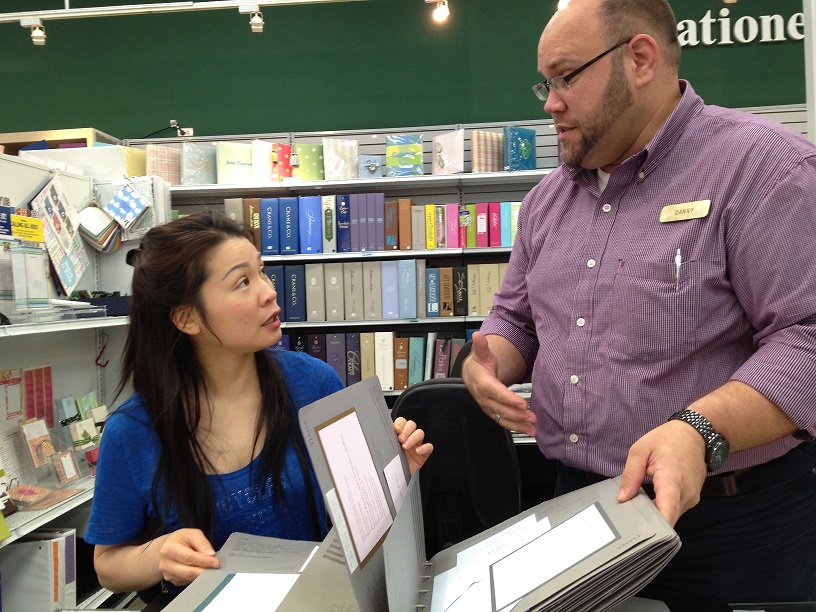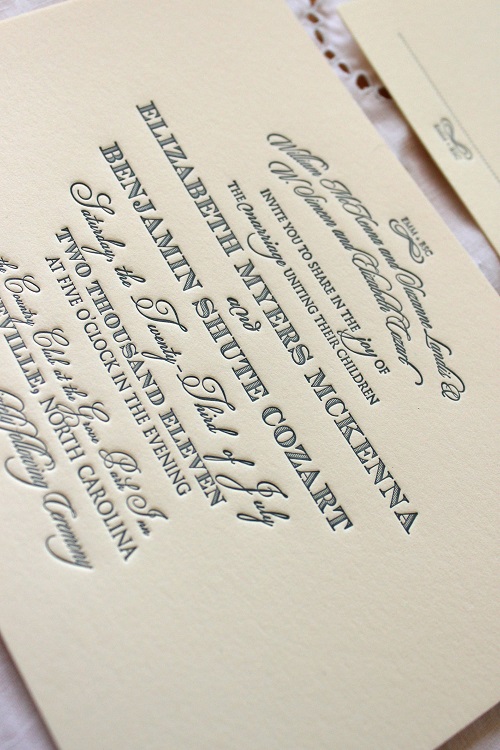Bering’s Stationers are Wedding Wording Pros!
Are you overwhelmed from planning a wedding or a large social event, particularly when it comes to small details like the invitation’s wording? Nancy Harper and Danny Seibert, two of the helpful stationers at our Bissonnet location, recently discussed how many customers appreciate the skill and knowledge of etiquette Bering’s stationers offer when helping to compose a grammatically-correct and socially-appropriate invitation. “It can be easy to make some common mistakes since the meaning of many phrases changes over time and the origins of social traditions are sometimes lost,” Danny said. Here are some of the most common wedding invitation wording mistakes Nancy and Danny have seen and their suggestions to correct them:
Honor /Celebrate – One invitation wording mistake is the incorrect usage of “honor” versus “celebrate.” “By definition, a person is honored and an event is celebrated,” Nancy explains. Examples of the difference in wording are “Please join us for a Birthday Luncheon honoring Janice Allen” and “You are invited to a Luncheon celebrating Janice Allen’s 50th Birthday.”
“Pleasure of Your Company”/”Honour of Your Presence” – Historically, if a wedding ceremony is held in a religious venue (church, synagogue, mosque, etc.), the phrase “honour of your presence” is appropriate. If a wedding ceremony is held in a non-religious or secular venue (hotel, private residence, outdoors, etc.), the phrase “pleasure of your company” is used, regardless of whether the service was officiated by a member of the clergy. “However, it’s not uncommon for this rule to be trumped by many brides (or mothers-of-the bride) who prefer for their invitation to maintain the more traditional wording despite the wedding’s location,” Danny said. Also, the American spelling of honor is often substituted for the more traditional spelling, honour.
Spelling out numbers – The most formal style of wording spells out the dates and times instead of using numerals. Be consistent throughout: if the date and year are spelled out, the time should be also. However, one exception to this is rule is the address street number. “We are asked all the time if the zip code needs to go on an invitation,” Nancy stated. “Customers are worried their guests are not going to be able to find the venue without it.”
“Technology continues to improve and a zip code is no longer necessary for Mapquest, Google maps and most GPS devices,” Danny added.
Afternoon/Evening – Another area that often needs clarification when spelling out a specific time of day is what is considered to be afternoon versus evening. Grammatically speaking, morning is the time between dawn and noon, afternoon is the time between noon and six o’clock, and evening is any p.m. hour six o’clock and thereafter.
“Another point to consider is that these two words (afternoon or evening) may seem like a minor detail, but they actually convey a lot of information to your guests,” Danny explained.
“The time of day listed on an invitation tells your guests what to wear,” Nancy added. In the U.S., unless otherwise stated, an event after seven o’clock in the evening is black tie formal and events earlier in the day are less formal.
Half Past/Half After the Hour – “Customers are often surprised to learn that to say ‘half past the hour’ implies the 30 minutes BEFORE the current hour,” noted to Danny, “since ‘past’ suggests that the time has already elapsed.” The correct wording for a time that is at the bottom of the hour is “half AFTER.” For example, 5:30 p.m. would be written as “half after five in the afternoon.” This is one of the phrases that has changed its meaning over time and requires clarification. “I regularly refer to The Wedding Blue Book by Crane & Co. or Emily Post’s Etiquette: Manners for a New World when there is any question about wording etiquette,” Nancy stated.
“Please R.s.v.p.” – Most invitations include some sort of request for guests to reply, or R.s.v.p. The term is an abbreviation for Répondez, s’il vous plaît, which means, “Respond, please” in French. “It is never correct to use ‘Please R.s.v.p.’ because that means ‘Please respond please.’” Danny points out.
“In case you’re not 100% comfortable with using “R.s.v.p.,” other wording options are “Please reply,” “Kindly reply,” or “The favour of a reply is requested,” added Nancy.
We’ve devoted an entire blog to this topic as well as other points on selecting the best wording for an R.s.v.p. Follow the link here.
At Bering’s Stationery, all of our associates work as team to provide outstanding, professional service to our customers. Come in today to either location and let one of our expert stationers help you craft your outstanding invitation!









